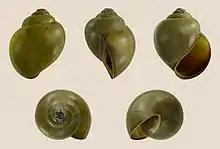Pila (gastropod)
Pila is a genus of large freshwater snails with an operculum, African and Asian apple snails, aquatic gastropod mollusks in the family Ampullariidae, the apple snails.
| Pila | |
|---|---|
 | |
| A shell of Pila polita | |
| Scientific classification | |
| Kingdom: | Animalia |
| Phylum: | Mollusca |
| Class: | Gastropoda |
| Subclass: | Caenogastropoda |
| Order: | Architaenioglossa |
| Family: | Ampullariidae |
| Genus: | Pila Röding, 1798[1] |
| Diversity[2] | |
| about 30 species | |
Distribution
Distribution of the genus Pila include Africa, Madagascar, southern Asia and Indo-Pacific islands.[3]
Species
Species within the genus Pila include:
subgenus Pila
- Pila africana (v. Martens, 1886)[2][3]
- Pila ampullacea (Linnaeus, 1758) - type species[2][3]
- Pila brohardi (Granger, 1892)[2]
- Pila cecillei (Philipi, 1848)[2][3]
- Pila globosa (Swainson, 1822)[2]
- Pila occidentalis (Mousson, 1887)[2][3]
- Pila ovata (Olivier, 1804)[2][3]
- Pila pesmei (Morelet, 1889)[2]
- Pila polita (Deshayes, 1830)[2]
- Pila saxea (Reeve, 1856)[2]
- Pila scutata (Housson, 1848)[2] - synonym: Pila conica (Wood, 1828)[4]
- Pila speciosa (Philippi, 1849)[2][3]
- Pila virens (Lamarck)[2]
- Pila wernei (Philipi, 1851)[2][3]
subgenus Turbinicola Annandale & Prashad, 1921[5]
subgenus ?
Ecology
Pila species are a host of a trematode Multicotyle purvisi.[8]
Human use
The shells of Pila are used in traditional ethnomedicine for weakness by Saharia people in Rajasthan, India.[9]
Pila ampullacea and Pila pesmei are some of the rice field snail species traditionally eaten in Thailand that have been displaced by the invasive golden apple snail, Pomacea canaliculata.[10]
References
- Röding P. F. (1798). Museum Boltenianum sive catalogus cimeliorum e tribus regnis naturæ quæ olim collegerat Joa. Fried Bolten, M. D. p. d. per XL. annos proto physicus Hamburgensis. Pars secunda continens conchylia sive testacea univalvia, bivalvia & multivalvia. pp. [1-3], [1-8], 1-199. Hamburg. page 145.
- "Pila". The apple snail website, Accessed 16 May 2011.
- Brown D. S. (1994). Freshwater Snails of Africa and their Medical Importance. Taylor & Francis. ISBN 0-7484-0026-5.
- Bouchet, P. (2013). Pila scutata (Mousson, 1848). In: MolluscaBase (2017). Accessed through: World Register of Marine Species at http://www.marinespecies.org/aphia.php?p=taxdetails&id=739934 on 2017-11-23
- Annandale N. & Prashad B. (1921). Rec. Indian Mus. 22: 9.
- Harzhauser, M.; Neubauer, T. A.; Bussert, R.; Eisawi, A. A. (2017). "Ampullariid gastropods from the Palaeogene Hudi Chert Formation (Republic of the Sudan)". Journal of African Earth Sciences. 129: 338–345. doi:10.1016/j.jafrearsci.2017.01.024.
- Harzhauser, M.; Neubauer, T. A.; Kadolsky, D.; Pickford, M.; Nordsieck, H. (2016). "Terrestrial and lacustrine gastropods from the Priabonian (upper Eocene) of the Sultanate of Oman". Paläontologische Zeitschrift. 90 (1): 63–99. doi:10.1007/s12542-015-0277-1. PMC 5448427. PMID 28626264.
- Alevs, Philippe V.; Vieira, Fabiano M.; Santos, Cláudia P.; Scholz, Tomáš; Luque, José L. (2015-02-12). "A Checklist of the Aspidogastrea (Platyhelminthes: Trematoda) of the World". Zootaxa. 3918 (3): 339–96. doi:10.11646/zootaxa.3918.3.2. ISSN 1175-5334. PMID 25781098.
- Mahawar, M. M.; Jaroli, D. P. (2007). "Traditional knowledge on zootherapeutic uses by the Saharia tribe of Rajasthan, India". Journal of Ethnobiology and Ethnomedicine. 3 (1): 25. doi:10.1186/1746-4269-3-25. PMC 1892771. PMID 17547781.
- Heavy Predation on Freshwater Bryozoans by the Golden Apple Snail, Pomacea canaliculata Lamarck, 1822 (Ampullariidae); The Natural History Journal of Chulalongkorn University 6(1): 31-36, May 2006
External links
| Wikispecies has information related to Pila. |
| Wikimedia Commons has media related to Pila (genus). |
This article is issued from Wikipedia. The text is licensed under Creative Commons - Attribution - Sharealike. Additional terms may apply for the media files.